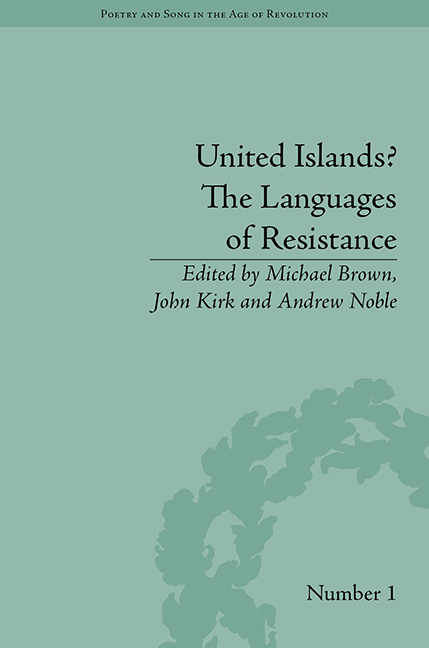Book contents
- Frontmatter
- CONTENTS
- Acknowledgements
- List of Figures and Tables
- List of Contributors
- Introduction: The Languages of Resistance: National Particularities, Universal Aspirations
- 1 Reading the English Political Songs of the 1790s
- 2 Why should the Landlords have the Best Songs? Thomas Spence and the Subversion of Popular Song
- 3 ‘Bard of Liberty’: Iolo Morganwg, Wales and Radical Song
- 4 Canonicity and Radical Evangelicalism: The Case of Thomas Kelly
- 5 Charlotte Brooke's Reliques of Irish Poetry: Eighteenth-Century ‘Irish Song’ and the Politics of Remediation
- 6 Homology, Analogy and the Perception of Irish Radicalism
- 7 Lost Manuscripts and Reactionary Rustling: Was there a Radical Scottish Gaelic Poetry between 1770 and 1820?
- 8 Virile Vernaculars: Radical Sexuality as Social Subversion in Irish Chapbook Verse, 1780–1820
- 9 Thomas Moore and the Problem of Colonial Masculinity in Irish Romanticism
- 10 Radical Politics and Dialect in the British Archipelago
- 11 ‘Theaw Kon Ekspect No Mooar Eawt ov a Pig thin a Grunt’: Searching for the Radical Dialect Voice in Industrial Lancashire and the West Riding, 1798–1819
- Afterword: The Languages of Resistance
- Notes
- Works Cited
- Index
6 - Homology, Analogy and the Perception of Irish Radicalism
- Frontmatter
- CONTENTS
- Acknowledgements
- List of Figures and Tables
- List of Contributors
- Introduction: The Languages of Resistance: National Particularities, Universal Aspirations
- 1 Reading the English Political Songs of the 1790s
- 2 Why should the Landlords have the Best Songs? Thomas Spence and the Subversion of Popular Song
- 3 ‘Bard of Liberty’: Iolo Morganwg, Wales and Radical Song
- 4 Canonicity and Radical Evangelicalism: The Case of Thomas Kelly
- 5 Charlotte Brooke's Reliques of Irish Poetry: Eighteenth-Century ‘Irish Song’ and the Politics of Remediation
- 6 Homology, Analogy and the Perception of Irish Radicalism
- 7 Lost Manuscripts and Reactionary Rustling: Was there a Radical Scottish Gaelic Poetry between 1770 and 1820?
- 8 Virile Vernaculars: Radical Sexuality as Social Subversion in Irish Chapbook Verse, 1780–1820
- 9 Thomas Moore and the Problem of Colonial Masculinity in Irish Romanticism
- 10 Radical Politics and Dialect in the British Archipelago
- 11 ‘Theaw Kon Ekspect No Mooar Eawt ov a Pig thin a Grunt’: Searching for the Radical Dialect Voice in Industrial Lancashire and the West Riding, 1798–1819
- Afterword: The Languages of Resistance
- Notes
- Works Cited
- Index
Summary
‘But he who would not be found tripping, ought to be very careful in this matter of comparisons, for they are most slippery things.’
Plato, The Sophist.If comparisons are slippery things, words are more treacherous still. Before I venture to discuss the presence or absence of radicalism in the Irish verse of the revolutionary era, it would be prudent to outline my understanding of the term. ‘Radicalism’ is a concept of English origin and the word entered the language in the early nineteenth century: the earliest citation in the Oxford English Dictionary dates from 1820, at which time it signified the political principles of those who advocated a ‘radical’ – that is to say, a root and branch – reform of the Westminster parliament. The use of the adjective in this context can be traced as far back as the 1780s when Christopher Wyvill proposed a ‘radical reform in the representation’ and John Jebb envisaged a ‘radical reformation’. Not unreasonably, if somewhat anachronistically, historians commonly describe those who campaigned for an extensive reform of parliament in the later decades of the eighteenth century as ‘radicals’ – from John Wilkes and the Society for the Defence of the Bill of Rights in the 1760s and 1770s, to John Cartwright and the Society for Constitutional Information in the 1780s, to Thomas Paine and the various Corresponding Societies of the 1790s. Aside from their core demand for parliamentary reform – encompassing such measures as frequent elections, more equal constituencies and a broader franchise – radicals also became identified with opposition to the royal prerogative, with support for religious toleration and repeal of the Test and Corporation Acts, and with sympathy for the American and French Revolutions.
- Type
- Chapter
- Information
- United Islands?The Languages of Resistance, pp. 109 - 124Publisher: Pickering & ChattoFirst published in: 2014



